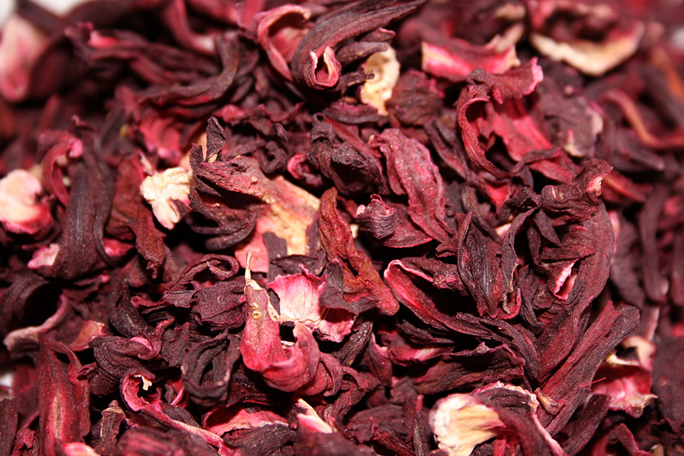Dried Roselle Hibiscus sabdariffa. Photo courtesy Creative Commons
There is no end to the things people will try to control weight, and no end to claims of weight loss for products. And as obesity becomes an ever greater health concern globally, anything that may help to control weight attracts attention.
Once in a while, something comes along that actually does in fact demonstrate efficacy. Now, a specific variety of hibiscus, a common flower, appears to be such a bright star. Also known as roselle, Hibiscus sabdariffa is native to west Africa, yet is cultivated throughout many parts of the world, including southeast Asia, Africa, the Caribbean, and throughout Latin America.
The bright red Hibiscus sabdariffa blossom has thick, leathery leaves and a pleasant astringent flavor. The flowers enjoy popularity as both a beverage and a food. Roselle calyses are typically prepared as an herbal tea, though in southeast Asia some juice drinks are also made with the flower. Jams are also made from the blossoms, and the blossoms are sometimes cooked with lentils or with fish and spices.
As a traditional medicine, Hibiscus sabdariffa demonstrates benefits for reducing high blood pressure. The flowers also show anti-diabetic and anti-cancer activity. Rich in the purple antioxidant pigments called anthocyanins, the hibiscus blossoms are also anti-inflammatory, due to their concentration of protocatechuic acid. Additionally, the presence of a sub group of anthocyanins called delphinidins may be key to the weight-controlling properties of the plant.
This gets us back to possible anti-obesity activity. A recent report in the April 2014 Food & Function Journal revealed the results of a human clinical study in which approximately half of obese participants were given tablets made from extracts of Hibiscus sabdariffa and half given a placebo. The study, which recruited obese patients between ages 18 – 65, was conducted in Taiwan at Chung Shan Medical University Hospital over the course of twelve weeks.
The placebo group of the study was given two sugar tablets three times daily, while the active group was given 450 milligrams of hibiscus extract in tablet form, two tablets three times daily. At the beginning and end of the study, various parameters were analyzed, including waist circumference, percent body fat, waist-to-hip ratio, serum lipase, blood glucose and more.
Results of the study were not spectacular, but they were encouraging. The patients who took the hibiscus supplements showed reduced waist circumference, reduced body fat percentage, and reduced hip-to-waist ratio over the course of the study. Actual weight loss itself was moderate, despite these changes.
Does this mean that hibiscus is the new miracle weight loss agent? No. But it does mean that hibiscus can be part of a program that helps people to steadily reduce weight. We have seen in various studies that coffee (without the sugar and cream), green tea and hibiscus all help with various dimensions of weight control and blood sugar modification. Drinking these beverages on a daily basis can help with steady weight control. Switching from a high-fat to a low-fat diet is one of the most effective things you can do to reduce weight, and reducing overall caloric intake is key. Getting onto your feet and walking, running, bicycling, swimming, dancing, skipping rope or doing practically anything physically active, will help you to burn calories and reduce weight.
The recent study shows that hibiscus is a good aid, but just that, an aid. In and of itself, hibiscus tablets or teas will not take you from rotund to svelte. That will never happen. But as an additional safe, healthy, beneficial agent loaded with protective compounds, hibiscus in various forms can help you to achieve your weight target.


